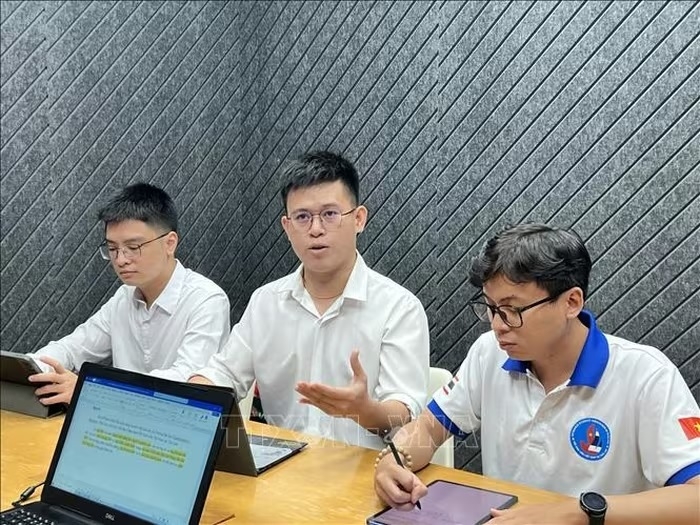Many contributions focused on how to effectively promote the intellectual resources of overseas Vietnamese (OV) students and scholars to serve the country’s development goals, and emphasized the role of science, technology, and education as key drivers of sustainable growth.
    |
 |
|
Nguyen Van Ky, a PhD student in Organic Chemistry (center) |
Nguyen Van Ky, a PhD student in Organic Chemistry, noted that one of the biggest challenges faced by OV students is the recognition of their degrees after completing studies abroad, due to a complex and multi-step administrative process.
He suggested Vietnam sign bilateral or multilateral agreements on degree and credit recognition with countries hosting large numbers of Vietnamese students. such as Thailand, arguing that such agreements can streamline administrative procedures and enhance transparency in degree recognition.
Meanwhile, both Nguyen Hoang Tuan, a master’s student in Oral Biology, and Nguyen Thi Thu Huong, a PhD student in Nursing, proposed establishing a network of Vietnamese students and scholars abroad through online platforms and short-term workshops to share experience, international skills, and develop mentorship programs led by OV experts and entrepreneurs.
Huong emphasized the need to strengthen communication and education for the younger generation about national traditions, so that they always understands their responsibility and takes pride in being connected with the homeland and contributing to the common development of the country.
Pham Dinh Hai, a master’s student in Petrochemical Engineering, said that Vietnam could study, learn from, and apply Thailand’s “Happy Learning” model. Consistently providing digital learning tools to students is a practical solution, he said, stressing the need for the early launch of national initiatives such as “Coding for a Better Life” to foster digital talent from an early stage, laying the foundation for a high-quality workforce in the digital economy era.
Pham Nguyen Nhu Quynh, President of the Vietnamese Student Association in Thailand, as well as a postdoctoral researcher in Organic Chemistry, offered several recommendations to encourage OV students to act as bridges for establishing partnerships between prestigious universities worldwide and educational and research institutions in Vietnam.
Quynh also proposed the creation of a digital platform where Vietnamese students and intellectuals at leading research centers abroad could share knowledge and provide remote mentorship on new technologies and research methodologies for startups and research teams in Vietnam. Additionally, she suggested the implementation of a fast-track degree recognition process by streamlining the legal framework and introducing an online approval system to expedite degree recognition for students studying at reputable universities abroad.
Source: VNA